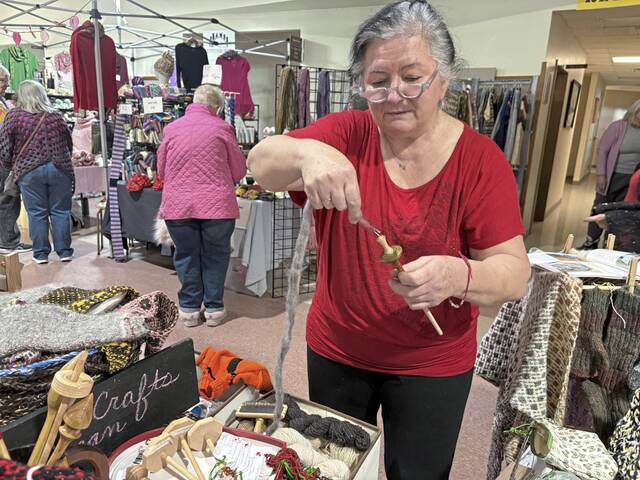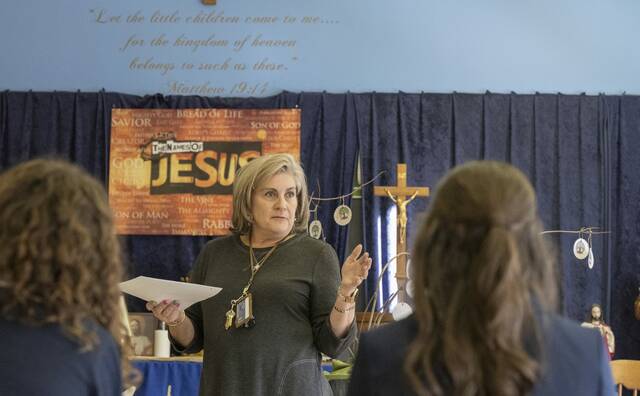Jackie Cafaro works day and night to rescue cats left abandoned on Pittsburgh streets.
She’s developed Catcalls Rescue, the nonprofit she co-founded in 2021, into an operation that saves, spays or neuters and puts up for adoption 40 to 60 cats a month — with the help of about 30 foster families, most of them in Allegheny County.
One word came to mind to Cafaro this week when Pittsburgh officials abruptly paused their free spay and neuter voucher service for city residents: “Overwhelming.”
“Bottom line: this city spay and neuter program, it’s the first line of defense for us small groups, and it makes a difference,” said Cafaro, 32, of Swissvale. “I definitely think, if we can’t direct people to this program … those cats are going to get pregnant. They’re going to have more kittens.
”And it’s going to get out of control.”
Pause in free service criticized
Cafaro is not alone.
Several animal welfare advocates on Wednesday warned the city’s move — which comes near the start of cats’ breeding season — could spike the region’s homeless cat population, increase the incidence of feline leukemia and viruses like parvovirus in pet cats, and end up costing Pittsburgh more in animal control than it spends on the spay and neuter service.
The city is pausing the service because suburban pet owners, some with designer dogs, have been faking their addresses to access free, taxpayer-subsidized spay and neuter services meant for use by Pittsburgh residents, officials said Tuesday. It intends to release “additional details and plans” next week.
City officials, however, said they don’t how many pet owners beyond city limits were using the free program. They refused to share reports on the alleged address deception.
“The reactivation of the cat program is a top priority in an effort to combat the homeless cat population,” public safety spokeswoman Emily Bourne said.
The program provided vouchers in 2023 for nearly 1,000 pets — 223 dogs and 751 cats — to be spayed or neutered, up from about 830 just one year earlier, Bourne said. The 2023 city budget allocated $70,000 to fund the program, which started in 2009.
Pittsburgh Councilwoman Theresa Kail-Smith told TribLive those behind the program have provided elected leaders with scant details to share with the increasing number of constituents calling her office in the wake of the announcement.
“People become accustomed to things being a certain way,” Kail-Smith said. “I think Animal Care and Control is one of them, just like trash pick-up.”
A problem elsewhere, too
The problem isn’t isolated to Pittsburgh.
In Philadelphia, volunteers and animal-welfare groups have stepped in to assist the city’s Animal Care and Control Team manage 400,000 homeless cats after city leaders slashed 20% from ACCT’s multi-million dollar budget during the covid-19 pandemic.
In Australia, by 2021, the government was paying $18.7 billion a year to control a feral cat population of up to 11 million cats. They employed everything from fencing and trapping to planting poison bait to kill them. The Invasive Species Council estimated those cats were killing more than 1 billion mammals and 399 million birds there a year.
In Pittsburgh, Cafaro said the problem has grown out of control — by Pennsylvania standards — since covid-19 stopped many veterinarians and clinics from treating animals.
Cafaro recently rescued nine cats from a North Side residence that housed 19 of them. That, she said, is a new normal.
Ripples seen in Westmoreland
Jen Johnson said the city program’s absence also will send ripples into Westmoreland County, where she expects the homeless cat population to grow.
Ninth Life Rescue Center, whose 40-plus foster homes Johnson manages, is looking for adoptive homes for more than 300 cats at any given time, she said. The group spays and neuters up to 75 cats during each of its free clinics. They hold the clinics about six times each year.
“I feel like we’re going to get flooded with people who need help — kitten season is fast approaching,” said Johnson, 29, who lives in the Greensburg area. “The next three months will be very tough. I feel all of this was poor planning.”
Cats’ breeding season typically starts around February, according to the National Library of Medicine.
Kittens can get pregnant as young as four months and they carry their offspring in the womb for just a short time — about 66 days, or two months.
A fertile cat can produce an average of three litters — each, typically, with four to six kittens — in one year, said the Spay-Neuter Assistance Program, an advocacy group with four U.S. locations. According to that math, one unspayed female cat could produce up to 4,948 kittens in seven years.
“People say ‘Oh, reproducing like rabbits!’” Cafaro quipped. “Rabbits are bad. But cats? They’re on that same level.”
Lydia Swanson started helping homeless cats at age 18, while living on-campus at the University of Pittsburgh. Today, they are the executive director of Oakland TNR Coalition, which has rescued or trapped, neutered and released (TNR) nearly 600 cats in four years.
They expect the pause in the city’s voucher program to mean increased costs for groups like theirs.
“We’re going to be seeing a lot of kittens in this city,” they said.
Kathleen Beaver, president and CEO of Animal Friends, said her organization started working with the city’s spay and neuter program in 2015.
Since then, the North Hills-based group performed about 400 to 450 spays and neuters through the program annually, Beaver said. The city paid them $35,000 a year, based on their most recent contract.
During the covid-19 pandemic, Beaver said the group put on hold its spaying and neutering program — and she saw the number of kittens in the area spike.
“By supporting the city’s efforts to get this program back online as quickly as possible with necessary changes, we look forward to avoiding this again,” said Beaver, in a prepared statement. “We strongly and passionately believe in this program and want to see it continue.”
Homeless cats have been a nuisance to some Pittsburgh neighborhoods for decades, said Jody Mader, who co-founded Catcalls Rescue with Cafaro.
Growing up in Allentown, Mader remembers picking up stray cats on the street and carrying them home on her bike.
Today, neighborhoods near her Mt. Washington home continue to be overrun by strays. She attributed decisions such as pausing the spay and neuter problem to policymakers who are “not in a neighborhood where this is a real problem.”
“We can only do what we can do, and we can only spend what we can spend,” said Mader, 41, whose group is 100% volunteer-driven and operates only on donations. “(The program pausing) renders us useless — and that’s terrible.”
Pittsburgh Councilman Anthony Coghill agreed, saying cat overpopulation is wreaking havoc on neighborhoods he represents, like Carrick and Brookline.
“That program was very beneficial,” Coghill said. “We have certain neighborhoods that are overrun with feral cats.”








